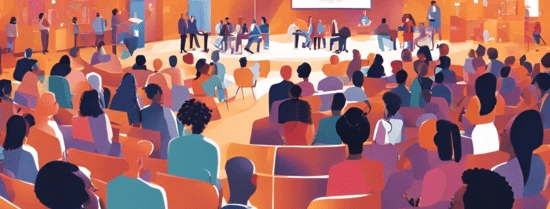Introduction
Key terms: qualitative and quantitative research, participatory methods, generating impact with your PhD project, civic engagement, stakeholder collaboration, introductory course, relevant for students in all PhD phases.
ECTS: 2.5
Number of sessions: 6
Hours per session: 4
This course supports researchers and educators in connecting their academic work with societal stakeholders through civic engagement. The ultimate importance of such civic engagement is that it increases the relevance, value and impact of academic work.
While some research or educational projects hold potential for societal responsiveness, translating that potential into meaningful engagement requires intentional design and collaboration.
The course is not theory-intensive. Instead, it emphasises hands-on project development, partnership building, and reflective practice, with the aim of supporting you with designing and implementing a civic engagement initiative within your research or teaching.
Through a mix of interactive lectures, group discussions, coaching sessions, and peer feedback, you will develop a civic engagement initiative while reflecting on your role and available tools. In addition, the course provides access to a network of experts and potential partners, and connects you with a growing community of civic-minded researchers and educators.
Participants are expected to attend all sessions, actively develop a civic engagement concept during and after the course, and commit to implementing their project within six months of course completion.
Entry level and relevance
This course is accessible to researchers from Erasmus University Rotterdam, Erasmus MC, or TU Delft.
No prior training in participatory research or community engagement is required. However, participants should have an initial concept for a civic engagement project.
The course is ideal for PhD candidates (in all phases of their trajectory), postdoctoral researchers, and educators who wish to embed civic engagement ideas into their academic work.
It is multidisciplinary and welcomes participants from all fields eager to collaborate across societal sectors.
Relations with other courses
This course complements the EGSH courses Action and participation in research for social change, which introduces participatory approaches, and Communicating your research to non-academics, which focuses on communication strategies.
While the former emphasises theory and methodology, and the latter concentrates on producing engaging outputs, Civic engagement in action focuses on hands-on project development—from idea formulation to dissemination—and on building sustainable stakeholder collaborations.
Before following Civic engagement in action, participants may find it useful to take Action and participation in research for social change to prepare or deepen their understanding of the subject matter. Afterwards, they could follow up with Communicating your research to non-academics to strengthen the communication aspects of their civic initiatives.
Key Facts & Figures
- Type
- Course
- Start date
- Not available yet
- Instruction language
- English
- Mode of instruction
- Offline
Start dates for: Civic engagement in action: Empowering researchers and educators to make an impact
Dates and locations for 2025-2026 are still to be determined. It will take place in the second semester.
What will you achieve?
- After the course, you will understand diverse definitions and purposes of civic engagement.
- After the course, you will have learned co creation methods to develop project ideas with diverse stakeholders.
- After the course, you will be able to design communication and engagement strategies tailored to various publics.
- After the course, you will recognise ethical and power-related challenges in civic engaged work.
- After the course, you will know how to identify and pursue funding or resources for engagement initiatives.
- After the course, you will be equipped to implement and reflect upon an engagement project within six months.
Sessions and preparations
Session 1: Introduction to civic engagement
The course starts with a general introduction to the notion of civic engagement. What does civic engagement mean in academic contexts, and why is it important?
Preparations: you may be asked to make some preparations for each session. Further details will be provided before the start of the course.
Session 2: Co creation and partnership building
We will explore diverse methods to engage stakeholders and build trust over time.
Session 3: Communication strategies
This session focusses on designing tailored communication for different audiences.
Session 4: Funding, resources and reciprocity
In session 4 we will identify funding opportunities and ethical norms of give and take in engagement work.
Session 5: Ethics and power dynamics
Session 5 reflects on positionality, power imbalances, and ethical frameworks in civic engagement.
Session 6: Share findings
In the last session, we will discuss how you can share your findings with both academic and societal audiences through creative and impactful formats.
Instructors
 Prof. dr. Jason Pridmore is Professor of Human Centric AI in Society at Erasmus University Rotterdam, with a focus on emerging technologies and social change. He is co-director of the Community for Learning Innovation and co-lead of the university’s AI strategy working group. He works in the Department of Media and Communication within the Erasmus School of History, Culture and Communication. Jason coordinates several major European research projects, including COALESCE, which aims to build a European Science Communication Competency Centre, and Inspiring and Anchoring Trust in Science.Email address
Prof. dr. Jason Pridmore is Professor of Human Centric AI in Society at Erasmus University Rotterdam, with a focus on emerging technologies and social change. He is co-director of the Community for Learning Innovation and co-lead of the university’s AI strategy working group. He works in the Department of Media and Communication within the Erasmus School of History, Culture and Communication. Jason coordinates several major European research projects, including COALESCE, which aims to build a European Science Communication Competency Centre, and Inspiring and Anchoring Trust in Science.Email address Dr. Charlotte Bruns is a postdoctoral researcher and lecturer at the Erasmus School of History, Culture and Communication. She specialises in qualitative methods, particularly visual analysis, and has substantive research expertise in science communication, the digitalisation of archives, and the historical and contemporary use of photography in scientific contexts. She is currently part of the EU-funded projects IANUS and COALESCE.Email address
Dr. Charlotte Bruns is a postdoctoral researcher and lecturer at the Erasmus School of History, Culture and Communication. She specialises in qualitative methods, particularly visual analysis, and has substantive research expertise in science communication, the digitalisation of archives, and the historical and contemporary use of photography in scientific contexts. She is currently part of the EU-funded projects IANUS and COALESCE.Email address Dr. Simone Driessen is an assistant professor in Media and Popular Culture in the Arts and Culture Department at Erasmus University Rotterdam. She specialises in popular culture and media studies, with a focus on fandom, audience engagement, and digital science communication. In addition to her work on media and fandom, she contributes to EU-funded projects projects IANUS and COALESCE, with a particular focus on digital and popular formats of public engagement.Email address
Dr. Simone Driessen is an assistant professor in Media and Popular Culture in the Arts and Culture Department at Erasmus University Rotterdam. She specialises in popular culture and media studies, with a focus on fandom, audience engagement, and digital science communication. In addition to her work on media and fandom, she contributes to EU-funded projects projects IANUS and COALESCE, with a particular focus on digital and popular formats of public engagement.Email address Chiara Stenico is Engaged Research Officer in the Engagement and Research Services (ERS) department. She focuses on Citizen Science and Participatory Research methodologies and processes of institutionalization of centralized and sustainable professional support to engagement research practices.Email address
Chiara Stenico is Engaged Research Officer in the Engagement and Research Services (ERS) department. She focuses on Citizen Science and Participatory Research methodologies and processes of institutionalization of centralized and sustainable professional support to engagement research practices.Email address Saskia Postema is Project Manager Challenge Based Education at TU Delft. She coordinates community engagement initiatives in WijStad to connect societal challenges with educators and researchers who can support finding solutions and support creation of neighbourhood university, WijkUniversiteit, a center for community learning in Delft.Email address
Saskia Postema is Project Manager Challenge Based Education at TU Delft. She coordinates community engagement initiatives in WijStad to connect societal challenges with educators and researchers who can support finding solutions and support creation of neighbourhood university, WijkUniversiteit, a center for community learning in Delft.Email address Jelle Burger is Lead Labs & Communities at Resilient Delta Initiative within Convergence. He is responsible for meaningful, accessible and inspiring collaborations in the Rotterdam region by leading research projects and innovation infrastructures on the interface of science, practice and society. He coordinates WijkWijs programme and supports participatory projects with local communities in Rotterdam.Email address
Jelle Burger is Lead Labs & Communities at Resilient Delta Initiative within Convergence. He is responsible for meaningful, accessible and inspiring collaborations in the Rotterdam region by leading research projects and innovation infrastructures on the interface of science, practice and society. He coordinates WijkWijs programme and supports participatory projects with local communities in Rotterdam.Email address
Contact
For questions, contact: Chiara Stenico via chiara.stenico@eur.nl
Facts & Figures
- Tax
- Not applicable
- Start date
- Not available yet
- Application deadline
- Monday 24 Feb 2025
- Offered by
- Erasmus Graduate School of Social Sciences and the Humanities
- Course type
- Course
- Instruction language
- English
- Mode of instruction
- Offline
- External link
- Register here
